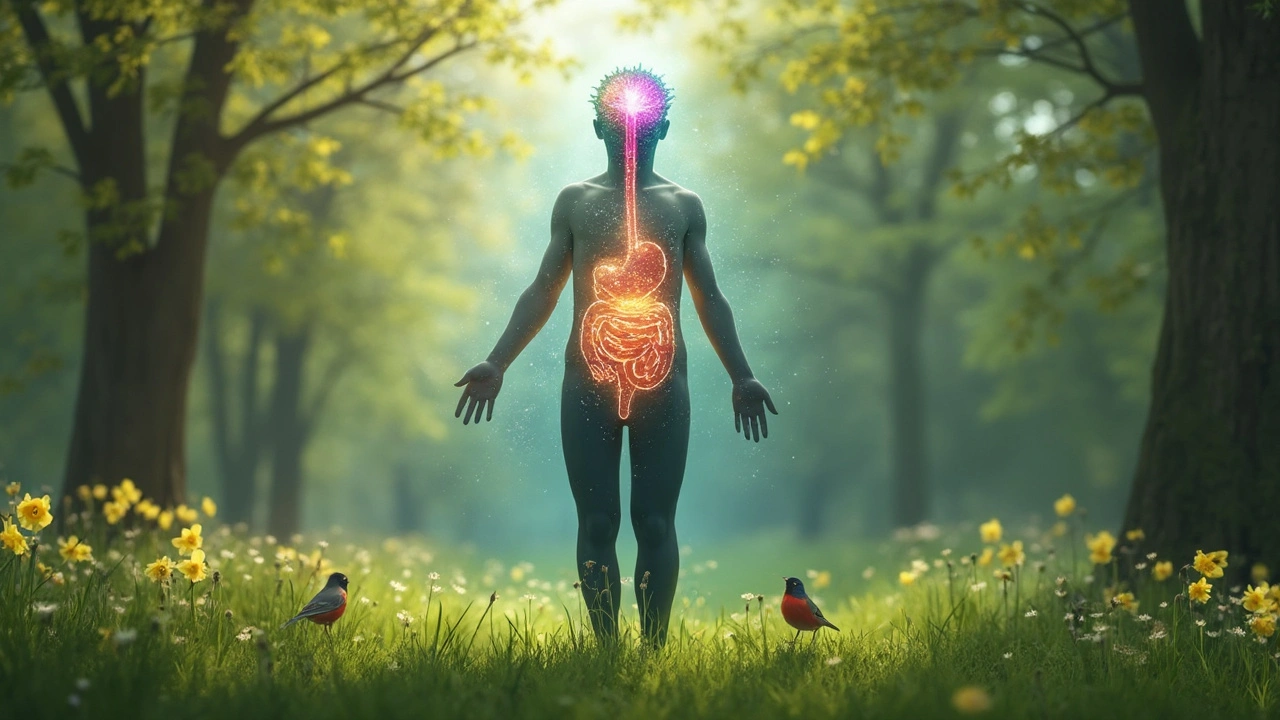Ever had a "gut feeling" that something was off, and it turned out to be true? Most of us chalk that up to intuition, but there’s something way more literal going on inside us. Your gut doesn’t just digest lunch — it actually sends signals that shape your emotions, your focus, even how motivated you feel to get out of bed. Imagine a world where anxiety, foggy thinking, or even slumps in motivation might start in your belly, not your brain. Sounds wild, right? But the science coming out over the past decade is turning old ideas about mental health upside down. If you haven’t thought much about your gut lately, you’re not just missing out on better digestion — you’re missing out on a secret weapon for a better mood and a clearer mind.
How Your Gut Talks to Your Brain
Stop for a second and think about your last super stressful day. Did your stomach tighten? Maybe you felt butterflies or even nausea. That wasn’t just stress making you sick — it was your nervous system flipping the switch on your digestive tract. The gut and the brain have a chemical messenger system known as the "gut-brain axis." This pathway is basically a high-speed fiber optic line, built out of nerves (like the famous vagus nerve), hormones, and even immune system responses. Here’s where it gets even more interesting: your gut is home to about 100 trillion bacteria, viruses, and fungi collectively called your gut microbiome. All these tiny tenants aren’t passive. They actively communicate with your brain, sending messages that affect everything from how happy you feel to your ability to handle stress.
The Harvard Medical School notes that about 90% of the body’s serotonin—the feel-good chemical—is made in the digestive tract, not the brain itself. If the gut environment isn’t healthy, production of these mood-regulating chemicals can slip out of balance. The result? You get cranky, anxious, tired, or even depressed. It’s not just serotonin, either: dopamine, GABA, and even stress hormones like cortisol come into play. When studies at UCLA looked at women who regularly ate probiotic yogurt, they didn’t just see a smoother digestion process; their brains actually processed emotions differently, showing less stress in fMRI scans after just four weeks.
What about anxiety or depression? The National Institute of Mental Health highlights that people with irritable bowel syndrome (IBS) are two to three times more likely to have anxiety or depression. The connection isn’t only psychological; it’s deeply biochemical. Digestive inflammation or a disrupted microbiome seems to feed back into the brain’s stress circuits, keeping people stuck in cycles of worry or low mood. This doesn’t mean that every mental struggle is entirely about your gut — but it’s becoming impossible to ignore how intertwined the whole system is.
Here’s a simple breakdown of some important signals and messengers:
| Messenger | Produced In | Effect on Mood |
|---|---|---|
| Serotonin | Gut cells & gut bacteria | Promotes happiness, calm, well-being |
| Cortisol | Adrenal glands, influenced by gut | Increases stress and anxiety |
| Dopamine | Gut, nervous system | Boosts motivation, pleasure |
| GABA | Gut microbes | Lowers anxiety |
So, next time your mood takes a dive, it might really be coming from your belly, not just your head.
What Messes With Your Gut, Messes With Your Mood
You can pamper your brain with mindfulness apps and therapy sessions, but if you’re blitzing your gut with junk food, the mood magic won’t last. The gut can get out of whack for all sorts of reasons — not just bad diet, but stress, antibiotics, pollution, processed food, and even too much alcohol. Processed foods loaded with sugars and artificial ingredients act like a bulldozer to your good bacteria, letting the troublemakers take over. And when harmful bacteria dominate, they pump out toxins known as "lipopolysaccharides," which stir up inflammation. That inflammation isn’t restricted to your belly either; it spreads through your bloodstream, messing with your brain’s ability to regulate emotions and make sharp decisions.
A 2022 study from King’s College London found that people who reported more fast food and sugary snacks not only had less variety of healthy gut bacteria, but also had higher scores for depression and irritability. That pattern doesn’t only show up in adults. Teens with a highly processed diet are showing more symptoms of anxiety, and their gut diversity is shockingly low compared to teens with traditional, home-cooked diets. The gut actually loves variety, fiber, and fermented foods, not bland sameness or sugar overloads.
And get this: chronic stress is a double-edged sword. Stress hormones change the way your gut bacteria operate, but then a troubled gut sends even more stress signals back up to your brain — a classic vicious circle. People living through major life events, like job loss or a breakup, often see their digestion go haywire first, sometimes before the mental symptoms even start. There’s also clear evidence from studies in Germany and Canada showing that gut inflammation can lower focus and memory, even without full-blown depression.
You might not realize everyday meds can disrupt your gut, too. Antibiotics wipe out bad bugs but also many of the good ones. Even nonsteroidal anti-inflammatory drugs (NSAIDs), like ibuprofen, can punch tiny holes in your gut lining, letting irritants and bacteria slip through and spark inflammation. This "leaky gut" can send your immune system into overdrive and make you feel on edge or constantly tired.
So, if you ever wondered why stressful times or antibiotic bouts seemed to cloud your mind or drag down your energy, there’s an answer buried deep in your digestive tract.

The Best Foods and Habits for a Happier Gut (and a Happier You)
You’ve probably seen yogurt drink ads promising to "boost your microbiome." Some of that is hype. But the truth is, you can totally nudge your gut in a happier direction with what you eat, how you live, and yes, even how much you laugh. Scientists in Norway ran a 2024 study where stressed-out college students were asked to add either one cup of fermented food daily (like kimchi, kefir, or sauerkraut), or one serving of leafy greens and legumes. The fermented food group not only felt better within weeks, but stool samples showed doubled levels of Lactobacillus and Bifidobacterium. Both kinds are linked to lower anxiety and improved mood.
Want more ideas you can actually use? Try these tips for a mood-friendly microbiome:
- Eat a rainbow: Different colored veggies and fruits feed different helpful bacteria. Go for berries, carrots, greens, purple cabbage, sweet potatoes.
- Don’t skip fiber: Beans, lentils, whole grains (like oats and barley), and apples feed your good gut bugs.
- Add fermented goodness: Think unsweetened yogurt, kefir, miso, kimchi, kombucha, or even old-fashioned pickles (not the vinegar-only ones!).
- Cut the added sugar: Swap soda or candy for fruit. Gut bacteria that thrive on sugar create toxins linked to worse moods.
- Stress less (your gut likes it): Try short daily walks, deep breathing, or even a quick dance break when stress hits — all proven to lower stress hormones measured in saliva.
- Sleep counts, too: People who get less than 6 hours regularly have a much less diverse microbiome, making stress harder to handle.
You don’t have to overhaul your life overnight. Even one new gut-friendly habit per week makes a difference. A Dutch research group found that people who switched to a Mediterranean-style diet for just four weeks had a 40% drop in self-reported “blue moods” and reported smoother digestion to boot. That was with no supplements, just good food.
Gut Health and Mood: Straight Talk on What Actually Works
The connection between gut health and mood is so solid that doctors in both gastroenterology and psychiatry are working together more than ever before. In 2023, the American Gut Project made its entire gut bacteria database available online, and it’s become clear—no two people have exactly the same mix of gut bugs. The real secret is finding what fits your own lifestyle and daily preferences.
Probiotics — supplements or foods with live bacteria — do help, but only as part of a bigger picture. Not every strain works for every person. For example, some strains of Lactobacillus ease bloating, while Bifidobacterium can boost mood or sleep. When buying supplements, check for live, active strains listed on the label, not just a vague “probiotic blend.” Eating real, whole fermented foods is often more reliable and safer than popping a random pill daily.
If you struggle with ongoing gut or mood troubles, don’t try to DIY everything forever. It’s okay to see a gastroenterologist, or even a nutritionist with extra training in the gut-brain axis. Personalized stool tests can actually map your own microbiome, so you know what you’re working with. This kind of tailored info is now available for home testing in most major countries as of March 2025.
Mental health is still about more than just bacteria; genetics, trauma, and social factors matter too. But if ever you wanted to take a little control back, starting with your gut is one of the most hands-on, daily things you can do. It doesn’t have to be some hard, expensive thing. It could be as simple as trying steel-cut oats for breakfast, swapping chips for carrots and hummus, or sharing a plate of real sauerkraut with lunch. Little changes over time snowball into real shifts in how you feel, focus, and even connect to others. So when your next tough day strikes and your mood feels "off," maybe it’s time to check in with your gut — your next good day might just begin on your plate.






